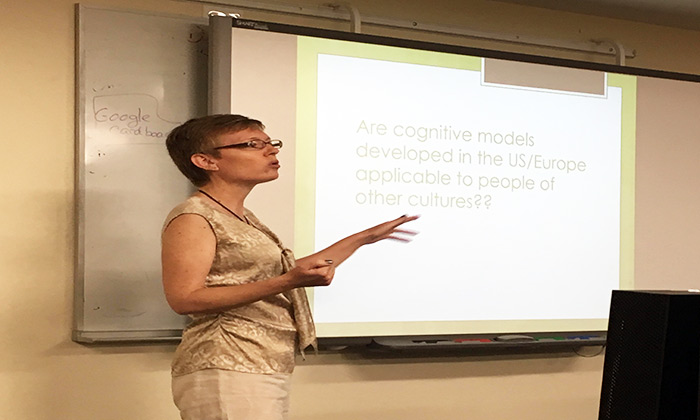As the health care landscape continues to evolve through technological innovation, researchers are exploring how artificial intelligence (AI) can be harnessed to combat the complex challenges posed by neurodegenerative disorders like Alzheimer’s disease. Through unprecedented insights that improve diagnoses and potential interventions, AI is believed to hold the potential of offering transformative solutions that positively impact the lives of patients and their loved ones.
Marymount University’s Dr. Catherine Diaz-Asper, Associate Professor of Psychology, is eager to more fully understand that potential. With an international team of collaborators, she recently developed an artificial intelligence machine learning model that can be used as an easily accessible tool to screen for cognitive decline — especially for those who can’t travel to a doctor’s office or medical center in a timely fashion. Based on lexical, syntactic, semantic and acoustic features of speech, the model can determine whether an individual is cognitively healthy, suffers from mild cognitive decline or has mild Alzheimer’s disease.
Dr. Diaz-Asper presented her research results last month at the 2023 Clinical Trials on Alzheimer’s Disease (CTAD) Conference in Boston, and demonstrated how this new method — which uses speech samples recorded over a telephone — can identify cognitive decline cases better than standard screening tools or even expert clinicians reading interview transcripts. Her research, which includes the speech of 91 adults with and without Alzheimer’s symptoms, shows the promise of AI pinpointing signs of developing cognitive decline, with a reported 75 percent success rate over traditional paper and pencil screening tools.
“One of the things that makes my research so impactful is that combining a low-tech and widely available device, the telephone, with high-tech analysis methods can potentially reach many more people who need dementia screening services,” Dr. Diaz-Asper said.
Dr. Diaz-Asper has been a Psychology faculty member at Marymount for over a decade, teaching a variety of classes specializing in biological and cognitive psychology and research methodology. She has been instrumental in the University receiving several noteworthy grants, such as last year’s grant from the Commonwealth of Virginia’s Alzheimer’s and Related Diseases Research Award Fund. She was also named a 2023 Fellow in Aging Research by Marymount’s Center for Optimal Aging.
“One thing that I’d like students to take away from all of my classes is how fascinating it is to study the ‘why’ and ‘how’ of human behavior,” Dr. Diaz-Asper shared.
Her interest in using AI to screen for cognitive decline dates back to when she was a student herself — from her bachelor’s and master’s at University of Auckland in New Zealand, to earning her Ph.D. from George Washington University and completing her post-doctoral internships at Johns Hopkins University and the National Institutes of Health. Trained as a neuropsychologist, she previously worked in a memory clinic and conducted research on memory deficits due to Alzheimer’s disease. In working with dementia patients, she learned about the difficulty many older adults experience in accessing screening and diagnostic services in their communities.
Dr. Diaz-Asper is keen to move this research forward on a larger scale and test the model with various groups, as well as implement the model in languages other than English. The end goal remains the same — to increase its applicability to more older adults who need it.
“I hope people learn that recent advances in natural language processing and machine learning can be applied to something as simple as a telephone conversation to aid in detecting cognitive decline.”
In January 2024, research by Dr. Diaz-Asper and her colleagues was featured by the American Psychological Association’s peer-reviewed scholarly journal. In American Psychologist, they dig deeper into their initial thesis and discuss balancing the ethical and legal implications of using AI to analyze speech and language. They argue that recent advances in automatic speech recognition, natural language processing and machine learning ‘offer extraordinary opportunities for researchers to better understand human thought and communication, automate time-intensive assessments, evaluate a variety of cognitive and psychiatric conditions and provide psychological information and care.’ However, they state that adopting these tools ‘requires careful consideration of several ethical and legal issues, including transparency and explainability, human agency and oversight, and equity and non-discrimination’ in order to reduce risks.
Click here for an extensive list of Dr. Diaz-Asper’s published research.







